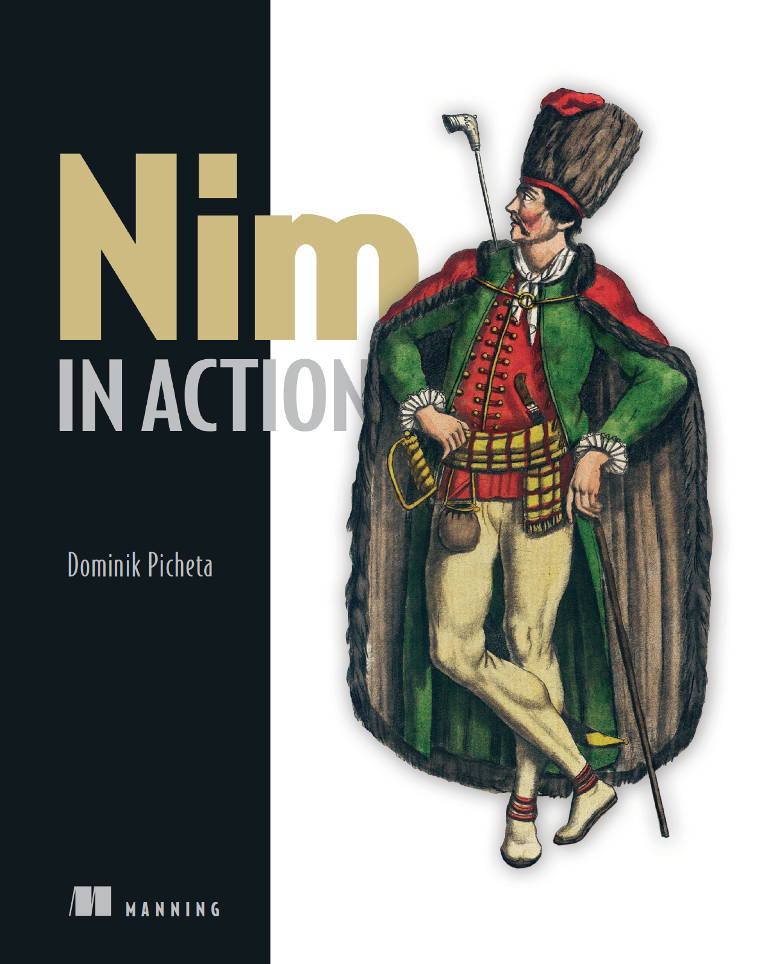An introduction
What is Nim?
Nim is an incredibly fast systems programming language that is expressive, extensible and really fun to use.
echo("hello, world")
Who develops Nim?
Volunteers
2,000+ PRs
2,500+ issues solved
500+ packages
$1500+ monthly contributions
Why Nim?
Let me whet your appetite...
...with a demo.
Snake
Vektor 2089

Search "Vektor 2089"
Goals
- Efficiency of a statically-typed compiled language with the ease of programming of a dynamic language, done right.
-
Reduce typing; no more:
foo.Foo foo = new foo.Foo(foo.INIT_FOO); - Fast!
- Reduce boilerplate
- Dependency-free programs
- Cross-platform programs
- Type and memory safe
Implementation
- Official compiler is written in Nim
- Compiles Nim source code to C/C++/Objective C and JavaScript
- Blazingly fast compilation speed
- No need for makefiles
Compilation speed
Time for another demo!
Basics
const N = 1024 # int
const str = "a simple юникода string\n"
var x, y: float
let ch = '\u1234'
#[ Define and use a type ]#
type
T = ref object
a, b: int
var t0 = T(a: 42, b: 0)
# Control structures
if len(str) > 0:
x = N # no need to explicitly cast
Values and types
let names: array[2, string] = ["Liam", "Andy"]
var numbers: seq[int] = @[1, 2, 3]
numbers.add(4)
let phoneBook: Table[string, string] = {
"John": "07712345678", "Jeremy": "0281234567", # ...
}.toTable()
type
Day = enum
Monday, Tuesday, Wednesday, Thursday, Friday,
Saturday, Sunday
let weekend: set[Day] = {Saturday, Sunday}
Procedures
import math
type
Point* = object
x*, y*: float
proc scale*(p: var Point, s: float) =
p.x *= s
p.y *= s
proc abs*(p: Point): float =
return sqrt(p.x*p.x + p.y*p.y)
var x = Point(x: 3, y: 4)
x.scale(5) # equivalent to scale(x, 5)
assert x.x == 15
Procedure on any type
proc say*(s: string) =
echo("Computer says: ", s)
"No".say()
say("No")
Procedure overloading
proc say*(s: string) =
echo("Computer says: ", s)
proc say*(s: string, count: int) =
for i in 0 .. <count:
say(s)
"No".say(5) # Output (x5): Computer says: No
Generics
proc say*[T](s: T) =
echo("Computer says: ", s)
say(0b01101011) # Output: Computer says: 107
Metaprogramming
Metaprogramming is the writing of computer programs with the ability to treat programs as their data. It means that a program could be designed to read, generate, analyse and/or transform other programs...
- This is Nim's specialty
- Reduces boilerplate significantly
- Generics, templates and macros
Domain Specific Languages
import jester, asyncdispatch, htmlgen
routes:
get "/":
resp h1("Hello world")
runForever()
Compile-time execution
proc fibonacci(n: int): int =
if n <= 2:
result = 1
else:
result = fibonacci(n - 1) + fibonacci(n - 2)
const fib20 = fibonacci(20)
echo fib20 # output: 6765
Other goodies
- Iterators
- Concurrency via async await
- Exceptions
- Effect tracking
- Soft real-time garbage collector
- Official package manager
- Concepts/Interfaces
- Rich standard library
My book

40% off: ctwnidevconf
Other links
- nim-lang.org
- forum.nim-lang.org
- r/nim subreddit
- IRC: #nim on Freenode
- Gitter: nim-lang/nim
- Twitter: @nim_lang or @d0m96
Thank you for listening!